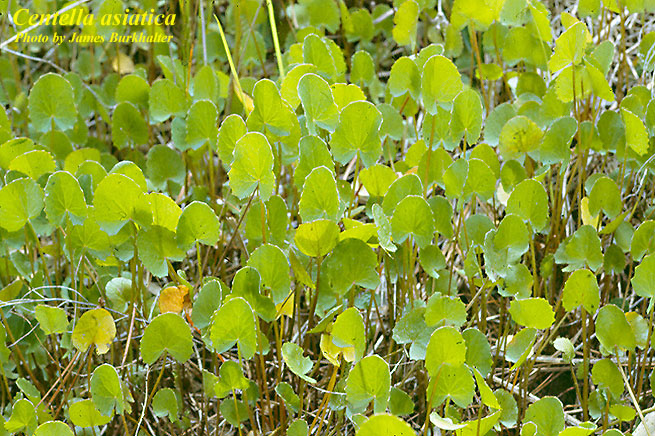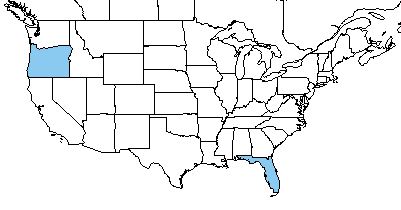Difference between revisions of "Centella asiatica"
| Line 32: | Line 32: | ||
==Ecology== | ==Ecology== | ||
===Habitat=== <!--Natural communities, human disturbed habitats, topography, hydrology, soils, light, fire regime requirements for removal of competition, etc.--> | ===Habitat=== <!--Natural communities, human disturbed habitats, topography, hydrology, soils, light, fire regime requirements for removal of competition, etc.--> | ||
| − | ''C. asiatica'' is found in savannas, pondshores, ditches, and a wide variety of other moist to wet habitats. <ref name= "Weakley 2015"> Weakley, A. S. (2015). Flora of the Southern and Mid-Atlantic States. Chapel Hill, NC, University of North Carolina Herbarium. </ref> <ref name = "FSU herbarium"> URL: http://herbarium.bio.fsu.edu. Last accessed: June 2018. Collectors: Ann F. Johnson, Cecil R. Slaughter, Dianne Hall, Kim Ponzio, Loran C. Anderson, R.F. Doren, Robert K. Godfrey, R. Kral, M. Darst, H. Light, L. Peed. States and counties: Washington County Florida, Indian River County Florida, Brevard County Florida, Gulf County Florida, Wakulla County Florida, Leon County Florida, Thomas County Georgia, Jackson County Florida, Covington County Alabama, Gadsden County Florida, Dixie County Florida. </ref> | + | ''C. asiatica'' is found in savannas, pondshores, ditches, and a wide variety of other moist to wet habitats.<ref name= "Weakley 2015"> Weakley, A. S. (2015). Flora of the Southern and Mid-Atlantic States. Chapel Hill, NC, University of North Carolina Herbarium. </ref><ref name = "FSU herbarium"> URL: http://herbarium.bio.fsu.edu. Last accessed: June 2018. Collectors: Ann F. Johnson, Cecil R. Slaughter, Dianne Hall, Kim Ponzio, Loran C. Anderson, R.F. Doren, Robert K. Godfrey, R. Kral, M. Darst, H. Light, L. Peed. States and counties: Washington County Florida, Indian River County Florida, Brevard County Florida, Gulf County Florida, Wakulla County Florida, Leon County Florida, Thomas County Georgia, Jackson County Florida, Covington County Alabama, Gadsden County Florida, Dixie County Florida. </ref> |
| + | |||
| + | Associated species: ''Xyris isoetifolia'', ''Hypericum lissophloeus'', ''Hypericum'' sp., ''Rhexia salicifolia'', ''Taxodium distichum'', ''Fraxinus profunda'', ''Quercus laurifolia'', ''Polygala lutea'', ''Pluchea baccharis'', ''Sarracenia flava'', and ''Proserpinaca pinnata''.<ref name= "FSU herbarium"/> | ||
===Phenology=== <!--Timing off flowering, fruiting, seed dispersal, and environmental triggers. Cite PanFlora website if appropriate: http://www.gilnelson.com/PanFlora/ --> | ===Phenology=== <!--Timing off flowering, fruiting, seed dispersal, and environmental triggers. Cite PanFlora website if appropriate: http://www.gilnelson.com/PanFlora/ --> | ||
Revision as of 12:50, 4 April 2019
Common name: Spadeleaf [1]; Centella [2]; Coinleaf [2]
| Centella asiatica | |
|---|---|

| |
| Photo by the Atlas of Florida Plants Database | |
| Scientific classification | |
| Kingdom: | Plantae |
| Division: | Magnoliophyta - Flowering plants |
| Class: | Magnoliopsida - Dicots |
| Order: | Apiales |
| Family: | Apiaceae |
| Genus: | Centella |
| Species: | C. asiatica |
| Binomial name | |
| Centella asiatica L. Urb. | |

| |
| Natural range of Centella asiatica from USDA NRCS Plants Database. | |
Contents
Taxonomic Notes
Synonyms: Centella erecta (Linnaeus f.) Fernald; Centella repanda (Persoon) Small
Varieties: none
Description
C. asiatica is a perennial forb/herb or subshrub of the Apiaceae family native to the Pacific Basin, excluding Hawaii. [1]
Distribution
While native to the Pacific Basin, C. asiatica has been introduced in the United States in Hawaii, Oregon, and Florida.[1]
Ecology
Habitat
C. asiatica is found in savannas, pondshores, ditches, and a wide variety of other moist to wet habitats.[2][3]
Associated species: Xyris isoetifolia, Hypericum lissophloeus, Hypericum sp., Rhexia salicifolia, Taxodium distichum, Fraxinus profunda, Quercus laurifolia, Polygala lutea, Pluchea baccharis, Sarracenia flava, and Proserpinaca pinnata.[3]
Phenology
C. asiatica has been observed flowering from April to August as well as September and October.[4][3] It has been observed fruiting in August, October, and November.[3]
Conservation and Management
Cultivation and restoration
Photo Gallery
References and notes
- ↑ 1.0 1.1 1.2 USDA Plant Database https://plants.usda.gov/core/profile?symbol=CEAS
- ↑ 2.0 2.1 2.2 Weakley, A. S. (2015). Flora of the Southern and Mid-Atlantic States. Chapel Hill, NC, University of North Carolina Herbarium.
- ↑ 3.0 3.1 3.2 3.3 URL: http://herbarium.bio.fsu.edu. Last accessed: June 2018. Collectors: Ann F. Johnson, Cecil R. Slaughter, Dianne Hall, Kim Ponzio, Loran C. Anderson, R.F. Doren, Robert K. Godfrey, R. Kral, M. Darst, H. Light, L. Peed. States and counties: Washington County Florida, Indian River County Florida, Brevard County Florida, Gulf County Florida, Wakulla County Florida, Leon County Florida, Thomas County Georgia, Jackson County Florida, Covington County Alabama, Gadsden County Florida, Dixie County Florida.
- ↑ Nelson, G. PanFlora: Plant data for the eastern United States with emphasis on the Southeastern Coastal Plains, Florida, and the Florida Panhandle. www.gilnelson.com/PanFlora/ Accessed: 18 MAY 2018